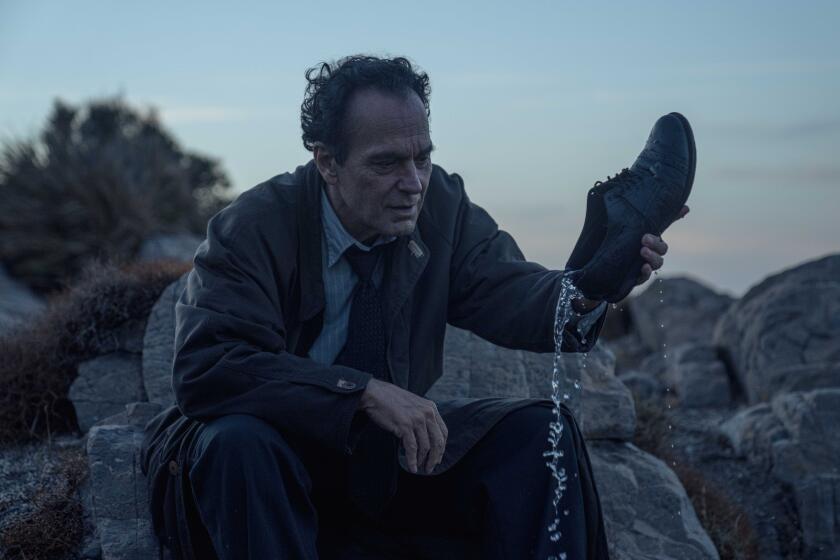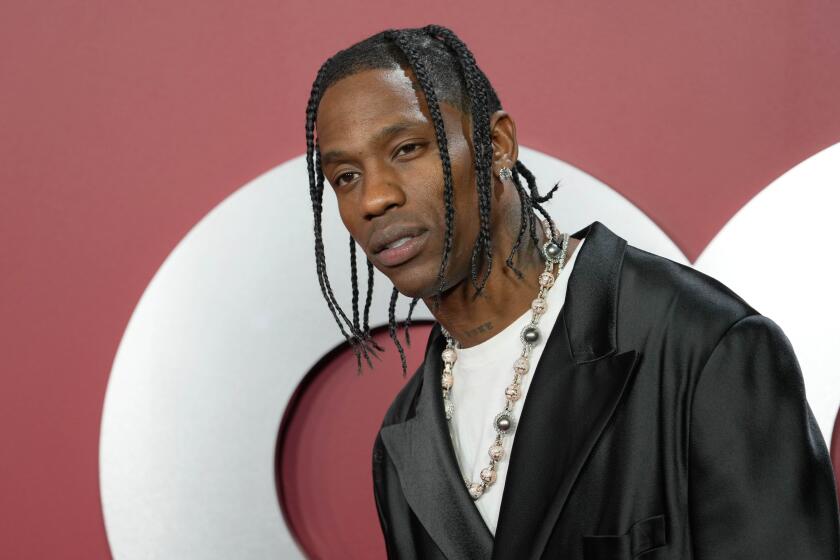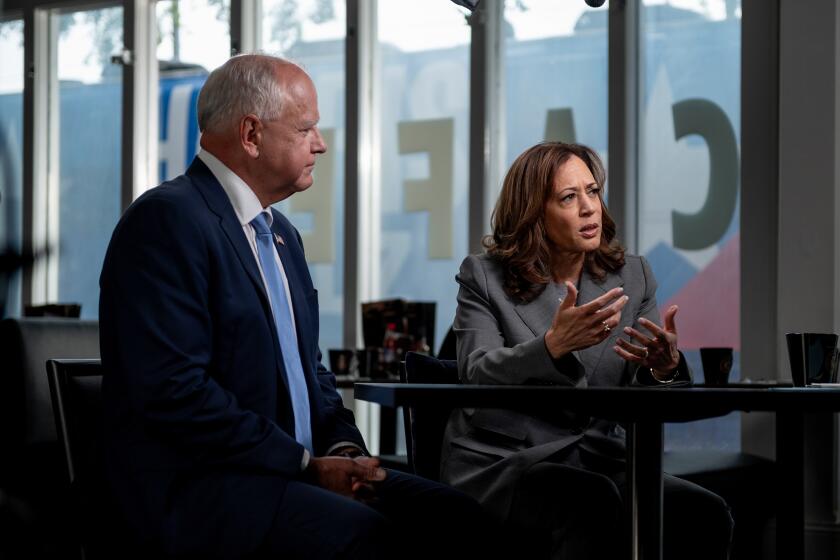Hollywood Burning : Blacks and the Industry: The smoldering debate--Is it economics or racism?
In the late 1970s and early ‘80s, when Thom Mount was head of production at Universal Pictures, the studio made a string of raucous black films, including “Car Wash,” “Bustin’ Loose,” and “The Bingo Long Traveling All-Stars and Motor Kings.”
Most got warm reviews. All made money, Mount says, because the studio knew how to reach the film’s core fans. “When we’d be in our marketing meetings,” recalled Mount, an independent producer of such films as “Bull Durham,” “we always used to say our target audience were 14-year-old members of the Black Stone Rangers, standing on the street corner in the South Side of Chicago. We knew they’d go see the movie-- and spread the word.”
How times have changed. Today’s Hollywood studios run on blockbuster economics, fueled by profits from packaged star-vehicles. With production at most studios geared toward mega-hits, industry critics have pointed to the absence of modest-budgeted films which feature black directors, writers or black casts.
For years, arguments have raged about why blacks have rarely been included in the Hollywood story-telling machine. Now the debate has taken a new twist--When Hollywood does sketch black issues, why is it so often from a white-man’s world perspective?
“Colors” provoked enormous controversy last year with its portrayal of the violent world of black and Latino street gangs. But the film’s stars were a pair of police officers--white actors Sean Penn and Robert Duvall--and the story was told through the eyes of the police.
“Cry Freedom,” a 1987 Oscar candidate, chronicled the brutal death of South African medical student Stephen Biko. Though Biko has become a world-famous symbol of political oppression, the film chose to focus on his relationship with a white newspaper editor, played by Kevin Kline.
“A World Apart,” released in 1988, also won critical acclaim for its vivid look at apartheid in South Africa. But its key character was a white activist journalist, played by Barbara Hershey.
Each film provoked angry rejoinders from the black community. But these heated debates mushroomed into a noisy public squabble with the release of “Mississippi Burning,” an Oscar-nominated Orion Pictures film starring Gene Hackman and Willem Dafoe that dramatized the FBI investigation of an infamous 1964 murder of three young civil-rights activists.
The movie’s focus on two white FBI agents--and its portrayal of blacks as fearful bystanders--provoked howls of protest from veteran civil-rights leaders like Atlanta Mayor Andrew Young and Bob Moses. Coretta Scott King wrote a syndicated column blasting the film before she even saw it. They argued that the film grossly distorted history, both by canonizing the FBI’s meager civil rights efforts and by failing to depict any forceful black activists.
Hollywood’s portrayal of black South Africans’ struggles against apartheid has come under similar attack.
“(‘Cry Freedom’ director) Richard Attenborough said in print he couldn’t get the $27 million to make (the story of South African back leader) Stephen Biko, so they focused the movie on the white guy--Donald Woods--instead,” said black film director Spike Lee.
“I give Attenborough lots of credit. He had the courage to make ‘Ghandi.’ But these kind of economic decisions warp people’s sense of history. You can’t explain the horror of apartheid by showing how it affects white liberal South Africans. Why not just take $6 million and make the Biko story--the real story.”
Black film makers charge that, with the exception of Eddie Murphy, major studios rarely cast black actors as the central figures of big-budget films, claiming white audiences won’t attend.
Blacks make up about 12% of the U.S. population, but recent marketing surveys have found that blacks represent as much as 25% of the moviegoing audience. Still, studio executives say, it is difficult black films that “cross over” to white audiences. Even when they make films about black issues, studio executives prefer stories that spotlight white heroes who either share or solve black problems.
Hollywood insiders contend that today’s hotly competitive marketplace requires marquee-value stars to provide enough box-office punch to “open” a new film. And most studio executives privately admit that outside of Eddie Murphy, not many--if any--blacks qualify. Even “Mississippi Burning” director Alan Parker has acknowledged that if he had cast blacks in leading roles, he would have had enormous difficulty finding wide distribution for the film.
“Hollywood’s biggest problem today is that it’s so blockbuster oriented,” said Taylor Hackford, who made “La Bamba” and “An Officer and a Gentleman.” “They focus so much attention on the big movies that I’m not sure they know how to market more unique pictures.
“The studio executive is a very timid breed--and maybe rightfully so. Ultimately Hollywood becomes an arithmetical business. If blacks make up 15% of the population, they say, ‘We’re throwing the dice and we want to hit as much of the audience as we can. So if we’re only reaching 15%, we’re not reaching enough people.’ ”
Since the dawn of the civil rights movement, each Hollywood generation has had a major black box-office star. In the 1960s, Sidney Poitier represented an optimistic, integrationist ideal. In the 1970s, Richard Pryor symbolized a fiery mood of black militancy. And since his explosive debut in 1982’s “48 HRS.,” Eddie Murphy has built a huge multiracial constituency with his daring comic sleight-of-hand.
Still, few black actors have flourished in their wake. Black entertainers populate the upper reaches of pop music, sports and television, but in Hollywood, black star power is a rare commodity. “People like to see movies where they can identify with the situation they see on the screen,” said one top producer who asked to remain anonymous. “I don’t think it’s racism. If you have a movie about old people, it’s not necessarily going to appeal to young people. And if you have a movie with all blacks, you’re only going to reach a black audience.”
Industry veterans say this attitude has prevailed for years despite the huge box-office appeal of “The Color Purple” and “Coming to America,” and the modest success of “A Soldier’s Story.”
“For years, the studio feeling was that whites wouldn’t go see movies if there were blacks lined up in front of the theater,” said producer Rob Cohen, who headed Motown’s motion picture division in the 1970s. “I remember when Universal was releasing ‘Bingo Long Traveling All-Stars and Motor Kings,’ they felt they couldn’t put it in Westwood because they didn’t think white audiences would go see a movie with lots of blacks on line.
“It wasn’t simply a matter of whites being uncomfortable. Sometimes they’d just ignore you. When ‘Mahogany’ came out, we took out a full-page ad in the Sunday New York Times--and no one saw it. It drove us crazy. You’d get this strange black-out factor in the white culture. No matter how much money you’d pump into TV commercials, no one would notice them. I’d ask people how they liked our full-page ad and they’d say, ‘What ad?’ ”
This benign neglect apparently stymied many young black actors’ careers. “If Billy Dee Williams had been white, he could’ve been another Tom Selleck or Richard Gere,” said one veteran Hollywood manager. “But pitching Williams in Hollywood was like selling ice to the Eskimos.”
How conservative is Hollywood’s attitude toward racial themes? Cohen says Motown tried to film a dramatic thriller about Stephanie St. Clair, a black woman who was wooed by--and warred with--gangster Dutch Schultz while running Harlem’s numbers rackets in the 1920’s. Diana Ross signed to play St. Clair, but according to Cohen “it was impossible to find a white star to play opposite her--or get a studio involved with that equation.”
Today it’s almost impossible for black actors to play romantic leads, even opposite black women. In fact, most black actors find work teamed with white actors in what the industry has dubbed “buddy” pictures. Many films with this action formula, including “48 HRS.,” “Lethal Weapon,” and “Running Scared,” have been box-office successes.
“White America is still uncomfortable with black actors unless you cast them in comedic or action roles,” said Taylor Hackford. “When I did ‘White Knights,’ we had scenes of a black man with a white woman--and we had big problems. It’s still a taboo. The film grossed $45 million, but almost exclusively outside the Southeast. We did no business there at all.”
Many film makers say even when they find a studio open to black subject matter, they are often encouraged to invent white characters to increase the film’s cross-over potential.
Producer Arnold Stiefel has a project in development called “The Last Mutiny,” a drama based on a bloody World War II mutiny by black midshipmen. “I think it would be a very gripping movie,” Stiefel said. “But wherever I’ve gone at the studios, they say to me--’We love the story, but can we somehow create a co-starring role for a white actor?’ ”
In a recent Premiere magazine story about pet-project films, director Jonathan Kaplan recounted his unsuccessful attempts to make “Homelands,” a Charlie Haas script about Harry Simmons, a black American sportscaster who goes undercover in South Africa. Even when budgeted at only $7 million, studios were nervous about the project, which featured a virtually all-black cast. “ ‘Can’t we make the lead white?’ ” Kaplan recalled the studio execs saying. “They knew there wasn’t a way, but they would ask anyway.”
Film makers have also raised eyebrows about “Glory,” a Tri-Star film now in production about an all-black civil war regiment--which stars Matthew Broderick. “I can’t believe you’d get that movie made if it starred Denzel Washington,” said Cohen. “That’s not to say that (director) Ed Zwick isn’t going to make a serious, credible movie. But it’s obvious that having Broderick on board will give the movie a perspective that appeals to white audiences.”
David Matalon, the president of Tri-Star Pictures who is now executive vice president of Columbia Pictures Entertainment, disagreed. “The white character was not at all essential to getting that movie made,” he said. “It’s a historical fact that the all-black regiment was led by a white officer. So we’re simply sticking with history.”
Late this summer, Orion will release “Heart of Dixie,” a 1957-era film that uses civil rights tumult as a backdrop to a coming-of-age story involving three Alabama co-eds, each played by a white actress.
Orion executive vice president of production Mike Medavoy stands by his studio’s issue-oriented films, which have included “Platoon” and “Colors.” “We’re very proud of the many socially committed films we’ve made during the past years,” he said. “There’s certainly a problem with race in Hollywood--and no one has an easy solution for it. But it’s a problem you see everywhere, in sports, politics and all across corporate America, not just here.”
Nonetheless, Stanley Weiser is still waiting for someone to make “Mississippi Summer,” his script about the events leading up to the 1964 murder of three young civil rights workers. According to Weiser, who also wrote “Wall Street” and “Project X,” launching the film was an uphill battle even before Orion made “Mississippi Burning.”
“My story focuses on the relationship between James Chaney and Mickey Schwerner, though it features a lot of characters based on black activists like Bob Moses and Stokely Carmichael,” said Weiser. “Thanks to (production exec) Lucy Fisher, Warners was the only studio to set up a development deal. None of the other studios would touch the project with a 10-foot pole.
“I don’t think many studio people actually care about social or political issues. They worship at the altar of the box office. When I went to Mississippi to do research, I’d heard of heroes like Rosa Parks and Medgar Evers. But I kept discovering all these other stories that I knew would make great movies--ones I know will never get made.”
Warners execs say “Mississippi Summer” could still go into production. But Weiser says it is “staggering” that the presence of one film could dampen interest in dramatizing more tales from such a pivotal moment in American history. “The industry has done Nazi Germany 20 million times,” he said. “But they’re worried about doing civil rights twice.”
Hollywood moguls insist these problems are grounded in economics, not racism. “It’s almost impossible to get a film made about a serious subject when the average picture costs $15 million to $17 million,” said MCA Motion Picture Group chairman Tom Pollock. “If films cost $1 million to make, you’d see a lot more adventuresome stories being told. But the system is rigged against doing serious films simply because of the costs.”
Hollywood’s increasing reliance on star-power creates an economic barrier for black actors who have not achieved celebrity status. “The risk of making a $16 million movie isn’t a question of black or white,” said Warner Films president Terry Semel. “The risk is--can I make my $16 million movie with a non-star lead? It’s clearly more difficult to market a film with unknowns. It means you can’t run ads where the audience will say, ‘Oh, I’ll see that picture because I loved the movies that star made before.’ ”
But can films with largely black casts cross over to white audiences? According to Matalon, Tri-Star’s “Tap,” the studio’s upbeat dance melodrama, has performed “pretty well, but not as well as we’d expected.”
“But I can’t blame that on the fact that it has a predominantly black cast,” he said. “I’m not sure if we’d made an all-white tap film that it would’ve done any better. In fact, our numbers show that 70% of our audiences are white.”
Semel said Warners current film, “Lean on Me,” has reached as many whites as blacks, despite a heavily black cast, headed by Morgan Freeman. “We felt we were making a movie about people, not just black people,” he said. “We deliberately did not cast a major white character because we felt it wouldn’t be accurate. This movie has such a good story, with such strong emotions, that it’s irrelevant whether it features white co-stars or not.”
At Universal, Pollock is preparing for the summer release of Spike Lee’s “Do the Right Thing,” a provocative, heat-of-the-summer drama about race relations in New York. “Will there be a white audience for the movie?” Pollock asked. “Who knows? It’s obviously not the kind of movie you can open in 1,000 theaters. But we believe it’s a challenging film, even if it offers certain truths which may be unpleasant for some people to hear.”
Pollock said Universal is also making “Ghost Dad,” a comedy directed by Sidney Poitier and starring Bill Cosby. “We didn’t pick Bill because he was black. We picked him because he was funny. In fact, the film was originally developed for Steve Martin. When he ended up doing another film for us, we cast it with another actor who happened to be black--and who will happen to have a black family. Race had nothing to do with it.”
Still, prospects for black film projects at other studios appear slim. If Columbia or Disney had any movies in the works, they weren’t talking. Both Columbia’s Dawn Steele and Disney’s Jeffrey Katzenberg refused interviews for this series. Executives who did speak for the record acknowledged that Hollywood is an insular, virtually all-white world, with few opportunities for young black film makers.
“We work in an industry where everyone has the same profile, the same judgments and the same interests,” said Rob Cohen. “In tone, Hollywood is a white, male, college-educated, Jewish milieu full of ambitious guys who want to play out their fantasies in the largest possible forum. You rarely see people come out of screenings debating the film itself. Everyone debates whether the film will do $20 (million) to $30 million--or $40 (million) to $50 million. When that’s the target you’re aiming for, films about minorities or adventuresome topics only get made out on the fringe, after long, bloody battles--or they don’t get made at all.”
According to Jeff Wallace, the Writers Guild’s Human Resources coordinator, minorities make up 1.6% of the union’s membership, translating into about 150 writers. However Wallace says virtually all those writers work in television.
“I can’t think of any black writers working regularly in feature films (excepting writer-directors like Robert Townsend). The talent pool is a bastion of white male talent. It’s a Catch-22 situation. Feature film people want writers with a track record, but it’s hard for a young minority writer to get that track record until you have a more open process.”
Industry insiders, speaking privately, offer a blunt assessment of black career opportunities. “Hollywood just isn’t a level playing field,” said one studio chief. “Look at a great young actor like Denzel Washington. He’s always wonderful in every movie he’s in. But will Denzel get as many good parts, especially for dramas or romantic leads, as he would if he were white? It’s doubtful--the system is stacked against him.”
Hollywood may present black film makers with something of a stacked deck, but industry experts say there is still cause for optimism. Eddie Murphy’s “Coming to America,” black cast and all, made more than $100 million. Paramount is now making “Harlem Nights,” a new film written and directed by Eddie Murphy that stars Murphy, Richard Pryor and Arsenio Hall.
Despite his outspoken views, Spike Lee has found a niche in the studio system, creating bold, personal films--that have made money. More recently, both “I’m Gonna Git You Sucka” and “Lean on Me” have racked up solid numbers and are expected to turn a profit.
“I see 200% more momentum in terms of black films than I’ve seen in years,” said producer Thom Mount. “If you want to see what signals cultural trends, you look to cartoon strips, followed by pop music and lastly film, simply because it takes so incredibly long to respond to something and get a film made.
“Over the past 12 months we’ve seen a big upswing in black leisure dollars, especially in the record business. Rap records and dance music records have been doing incredibly well--there are more black pop stars today than in ages.”
Taylor Hackford, whose New Visions Pictures is making a film biography of R&B; legend Ray Charles, also predicts Hollywood will cash in on black music’s commercial upswing--and recent black films’ box-office success. “The way to wake up Hollywood is through their pocketbook,” he said. “Hollywood is a great whore. If they can make money, they’ll lay down for anyone. The best motivator to priming the studio pumps is having your movie make money.”
Now that “I’m Gonna Git You Sucka” is perceived as a low-budget hit, writer-director Keenen Ivory Wayans says he’s taking a lot more meetings with key industry players. “Success is the only way to get into the system,” he said. “Now that ‘Sucka’ is making money, I’m a wanted commodity. I can at least get in the door.”
Before the studios lumber into action, the sleeker independent companies--which can make films faster and considerably cheaper--will hop on the bandwagon.
“The truth is that it doesn’t always make economic sense for the studios to do black-oriented films,” explained Mark Burg, president of Island Pictures, which has several rap and reggae-oriented music dramas in development. “The auxiliary markets, whether its home-video or overseas, are virtually non-existent. But we can do low-budget, $1.5 million films which gives us a much better chance of making our money back.”
Will these low-budget hits give black films a better shot at major studio dollars? “You see black stars all over the place now, in TV and in pop music,” said Mount. “The cultural winds are changing--and studios do respond to those changes. The only problem is sometimes they forget to stick their fingers in the air to see which way the wind is blowing.”
Next: The trials and tribulations of black film makers in Hollywood.
More to Read
The biggest entertainment stories
Get our big stories about Hollywood, film, television, music, arts, culture and more right in your inbox as soon as they publish.
You may occasionally receive promotional content from the Los Angeles Times.






